Domestic Travel Insurance – Why You Should Buy Domestic Cover
Whether you are exploring Australia for fun or taking an important business trip, having interstate travel insurance behind you can often mean an easy and assuring experience. Here are some of the most common things that domestic travel insurance for Australians can cover:
1. Cancellations?
It’s usually easy to cancel or postpone a domestic trip compared to an international trip, but it may not be so easy to forfeit the money you’ve already paid. If you have to cancel your travel plans due to an unforeseen/unexpected event, travel insurance can allow you to claim back some (or all) of the funds you have lost due to cancelling flights, accommodation, delays, car hire and more.
2. Baggage & Belongings
It can be frustrating when your possessions aren’t where they are supposed to be, no matter where in the world you are. The right domestic travel insurance can ensure your baggage and belongings are covered in regards to delays, losses or thefts. Your Product Disclosure Statement will tell you exactly what items and circumstances you are are protected for. If there is something specific you are concerned about, consider upgrading your cover.
3. Rental Cars
Rental cars can make any Australian trip highly convenient, but you may need extra travel insurance cover in case the vehicle becomes damaged or is stolen while in your care. You will also need to make note of any exclusions relating to your rental car cover; for instance, if you carry out any illegal activities while driving (e.g. drink driving) or if someone else is driving the car at the time of an accident, you usually won’t be able to claim.
4. Sports & Recreational Activities
Activities like skiing or golfing can be lots of fun while holidaying in Australia and certain levels of travel insurance can also mean you have the opportunity to cover yourself for any equipment or gear you hire. You should note, though, that this may not be an automatic part of domestic travel insurance, which means you’ll need to request to add this particular type of cover into your policy.
5. Business Equipment
If you are travelling for business, the last thing you’ll want is for your equipment to become damaged. Many forms of domestic insurance will allow you to include cover for your business equipment (such as laptops, tablets) in your policy. If you lose or damage your equipment, you may also be able to claim business equipment hire and courier expenses.
If you are uncertain about any area in your travel insurance package, make sure you read the Product Disclosure Statement (PDS) or contact our customer service agents before you buy to understand your options.
You’re covered for cancellation – but do you know what that really means?
When it comes to getting your travel insurance directly from a provider, many of us want that little nugget we know as cancellation cover.
But then we put in a claim for something we’ve cancelled and – whoa! – it gets denied. Why? What went wrong?
A quick explanation of cancellation cover
In a nutshell, cancellation cover, in terms of travel insurance, means that if something goes wrong and it is necessary and unavoidable to cancel your trip before you head off, you may be able to claim back money you otherwise have lost (up to the amount stated in your insurance policy).
For instance:
- Diane books an end-of-year trip to Paris. A week before she’s scheduled to depart, she’s injured in a minor car accident and isn’t allowed to travel. She has to cancel her flights (which cost $2,500) and her hotel booking (which cost $1,800).
- Neither the airline nor the hotel will give Diane a refund, meaning she’s now out of pocket for $4,300. But through her travel insurance, Diane can recover the money she’s lost less any excess payable.
What exactly can you claim for under cancellation cover?
Cancellation generally covers you for the cost of cancelled flights, hotels, visas, tours/excursions, paid-for activities or sports, and prepaid meals, less applicable excess. This is all assuming that the expenses cannot reasonably be recovered from any source.
If you booked your trip through a travel agency and they charged you fees, you might be able to claim back some of these costs too, depending on your policy.
Getting the ’emergency’ circumstances of your claim right
What constitutes an emergency at InsureandGo?
- The unforeseeable death, injury, or illness of you (or your relative, business associate or travelling companion, in some instances).
- A fire, storm, flood or burglary at your home or place of business within 48 hours of your leaving date.
- When you, your relative or your travelling companion are a member of the armed forces, police, fire, nursing or ambulance services and you have to stay in Australia because of an emergency or you are posted overseas.
- Falling pregnant after purchasing the Policy and where you will be more than 30 weeks pregnant (or 20 weeks for multiple pregnancies) at any time during your trip or where your doctor advises you’re unfit to travel due to complications of pregnancy and childbirth.
- A cancelled education or tuition course overseas, if the sole purpose of your trip is to attend that course and it was cancelled due to circumstances outside your control.
What aren’t you covered for?
Cancellation won’t cover you if you simply change your mind about your trip or fail to organise your trip properly – e.g. if you booked the wrong leaving date or you didn’t organise your visa/passport in time.
You also won’t be able to claim under cancellation if you can’t get leave from your job if you miss your flight (or similar) or if you didn’t tell the appropriate organisations that you cancelled your trip and were charged extra because of this.
What happens if you need to cancel your trip after you depart?
Take note! Cancellation only covers you if you cancel your trip before your planned leaving date.
If you want cover for cancelling your trip after you leave, you’ll need to choose a policy that offers:
- Trip Curtailment, which will cover you (for up to the amount in your policy) if you need to cut your trip short and return home.
- Journey Resumption, which covers the cost of your airfare from Australia if you’ve returned home (due to an emergency) and then need to pick up the same trip later on.
Just how much money can you claim back?
How much money you can claim under cancellation will depend on the limits in your specific travel insurance policy (by the way: Limits mean the maximum amount of money you can claim).
- Some insurance levels (such as InsureandGo Gold) offer unlimited cover if you cancel your trip. This means your claims aren’t capped, so you can claim back the costs of any prepaid flights, hotels etc. if cancellation of your trip is necessary and unavoidable due to any one of the many reasons listed in the policy.
- Other insurance products may only let you claim up to a certain amount (and others may not even offer cancellation cover at all). For instance:
- Sam does the right thing and ensures his trip to New York, but it only includes $4,000 of Cancellation cover. Due to a death in the family, Sam has to cancel. His flights cost $3,000 and his hotel bookings cost $2,500.
- Sam can only claim back $4,000 in cancellation, so he loses $1,500 of his own money.
Add up the total cost of all your bookings to see if your cancellation limit is enough to cover you if you end up cancelling your trip.
InsureandGo offers unlimited cancellation cover under our gold policy, and up to $15,000 in cancellation under our silver policy. Grab a quote now!
The best tricks for finding cheap flights
2nd of July 2019
The cost of flights is often one of the greatest expenses travellers are hit with. But thankfully, there are many ways you can help bring down the cost of your airfares.
Scoring cheap flights can be a rather simple process if you know the best tricks and tips. There is often a lot of conflicting advice online when it comes to ways you can find cheaper flights, which can make it a bit difficult to know which tips actually work.
In the ever-evolving travel industry, we have dug deep to uncover the latest helpful advice that will give you the best chance of keeping your airfares low, so you can spend your money on more important things, such as travel activities and unforgettable experiences.
By considering cheap travel insurance before your holiday, you can save some costs if the unexpected happens. Often, the most expensive situations in life come about unexpectedly, and it pays to be prepared.
InsureandGo offers travel insurance policies that offer protection for trip cancellation before departure, travel delays, having to cut your trip short, lost or delayed luggage, and most importantly, overseas medical treatment.
Be flexible
One of the easiest ways to get cheaper flights is to be flexible with both your holiday destination and your travel period.
Not everyone has the luxury of flexibility, but those who do will find they have a much better chance of scoring the best available flight deals.
Many of us are in the habit of choosing a holiday destination and then searching flights, but you can often score a much cheaper holiday by doing things in reverse.
By checking flight prices online to various destinations first, you can find what regions currently offer the cheapest flights and narrow down a list of places that interest you.
Having flexibility regarding when you travel will allow you to avoid travelling during peak periods when most travellers choose to fly, such as around popular holidays and festivals.
Being flexible will also allow you to select the cheapest days and hours to fly. If you happen to have several local airports to choose from, flexibility will also allow you to choose the one offering the cheapest airfares.
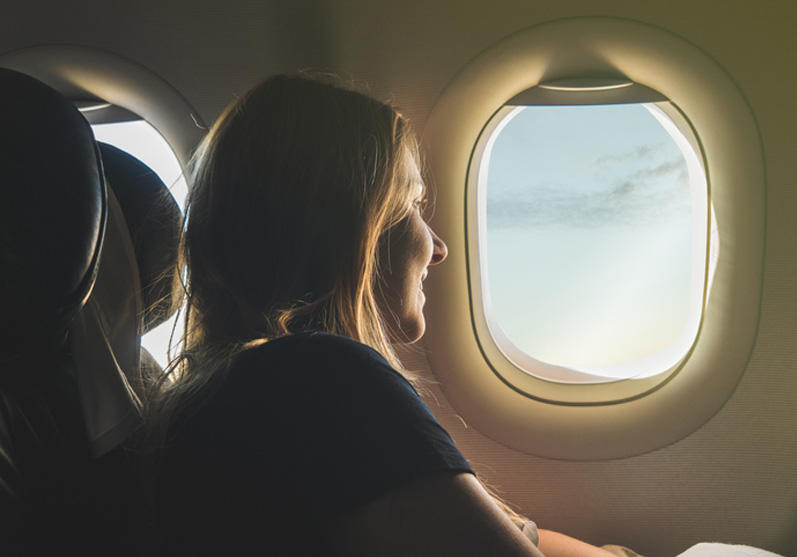
Avoid the peak travel period
So we have just covered that being flexible with your travel plans will allow you to avoid peak travel periods, but what are those periods?
More people fly around the major holidays such as Christmas, New Year's, and Easter. You must be aware that different countries may also celebrate holidays you are unfamiliar with, so you want to make yourself aware of these in order to avoid them if you’re looking for cheaper flights.
Because there is such a large demand for these travel dates, airfares are almost always higher than normal. Peak airfares are also at their highest when a region is experiencing their finest weather for the year.
Choosing to travel during the winter months or rainy season can allow you to take advantage of much cheaper flights, but you must weigh the drawbacks of visiting destinations when the weather may not be as appealing.
For North America and Europe, the most expensive flights are usually found during the summer months, running from June to September. This is also true with many African safari destinations like Kenya, as these months correlate with the dry season, which usually provides better wildlife viewing opportunities.
From January through May, you should be able to purchase flights at much cheaper rates to these regions.
For domestic travel around Australia as well as foreign destinations like Cape Town and Buenos Aires, the cheaper flight months are, of course, reversed since these regions are in the Southern Hemisphere and the seasons are opposite.
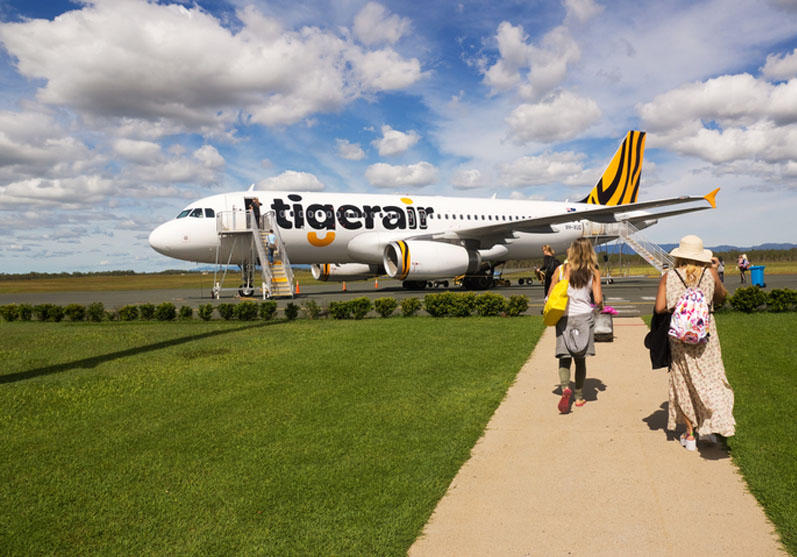
Choose budget airlines
If you’re willing to sacrifice a bit of comfort and service during your flights, flying with a budget airline can be a great way to save costs on your airfare.
There was a time when you only had the option of choosing budget airlines for shorter domestic routes, but today we find more and more budget airlines flying long-haul international routes as well.
Of course, you have to decide if the discomfort of flying a budget airline is tolerable for long-duration flights. The reason budget airlines can offer much better rates is the fact that they pack more seats onto their planes, which sadly equates to less leg room for passengers.
Budget airlines also don’t usually include luggage allowances, complimentary food and drink, or entertainment in the price of their fares. You may also be hit with fees if you wish to select your seat or when choosing to pay with a credit card.
You must make sure to add up all the extra fees associated with a budget flight if you plan on using extra services.
Sometimes you may find that flying budget airlines while choosing all the extra services, such as added bags and meals, will cost you more than flying a full-service airline.
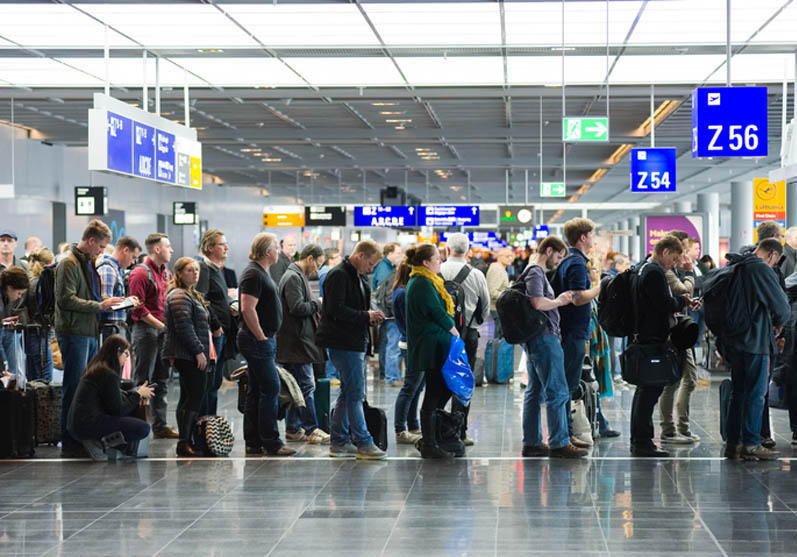
Connecting flights and flying multiple airlines
If your airline travel involves a route with multiple legs, don’t feel as though you need to stick with the same airline for all those legs.
You can save a considerable amount of money by mixing and matching airlines to come up with a cheaper overall flight journey to your destination.
This also allows you to select a more comfortable full-service airline for a long-haul leg, but then switch to a budget airline for any shorter legs that may follow.
Choosing routes that have connecting flights as opposed to direct or non-stop flights is generally cheaper as there is often less demand due to their longer journey time and inconvenience.
Of course, you must be sure to allow yourself plenty of time between connecting flights, especially if you are planning on mixing different airlines.
The new airline for your next route won’t be responsible for rebooking you a new flight if your previous leg was on a different airline and that flight is severely delayed.

When to book your flights?
Knowing when exactly you should book your flights after deciding on a holiday somewhat depends on where you are travelling to.
In general, the best rates for flights seem to be offered around two months before the actual flight date. If you’re planning on travelling during peak periods like the major holidays, you may want to purchase your flights a bit earlier.
Airline fares tend to increase in price the closer you get to your intended travel dates. You don’t, however, want to book too far in advance, as you may miss out on special offers and sales that may be offered if there is a lack of demand for certain flights.
Last-minute flights to destinations experiencing their off-peak season might be better priced closer to the date, for example.
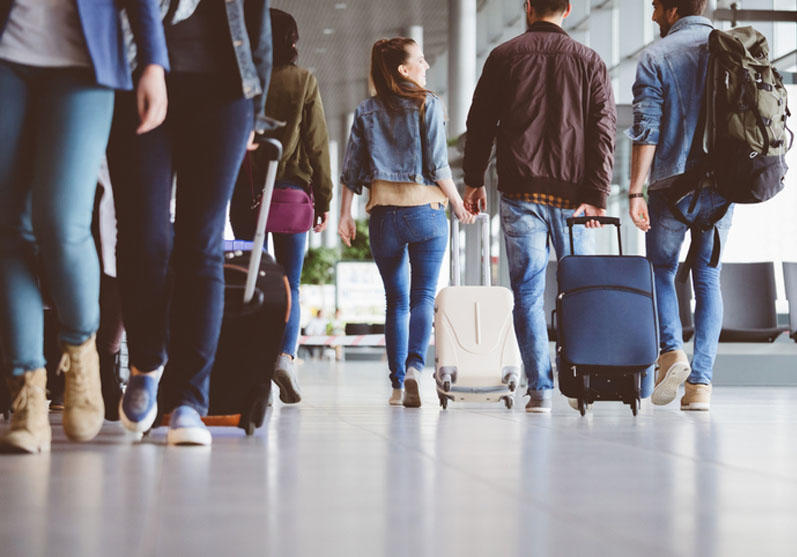
Cheapest days to fly
Flights tend to be more expensive towards the end of the week and the end of a weekend.
People seem to be either taking off to enjoy a long weekend holiday or trying to get back in time for the beginning of the work week. This means Sundays, Thursdays, and Fridays tend to be the most expensive days to fly.
Those looking to score cheaper airfares should look at booking flights for Tuesdays, Wednesdays, or Saturdays. Of course, this can change depending on what days of the week major public holidays or special events fall on.
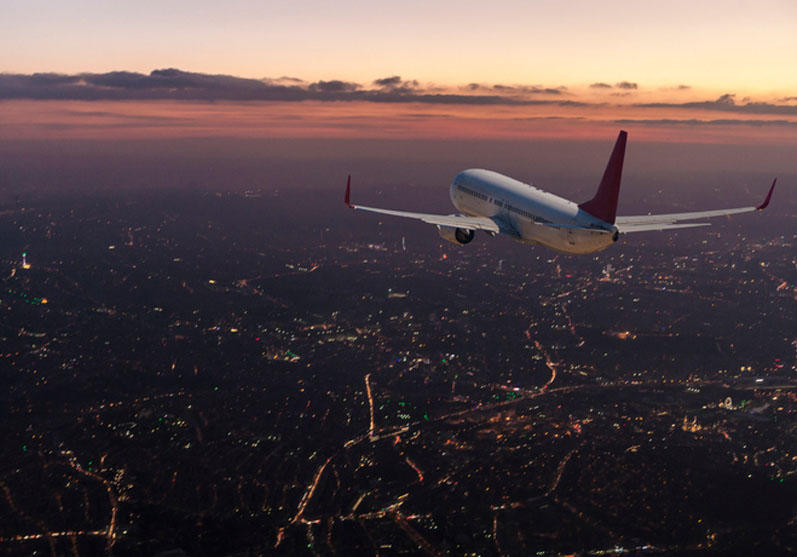
Cheapest time of day to fly
You can also get better deals on flights by choosing flights at less popular times.
Early morning flights and late evening flights tend to be the least popular and therefore offer up the best deals. This, of course, means you may have to wake up during the early AM hours to give yourself enough time to arrive at the airport and check in.
Late night flights, on the other hand, can have you getting in around midnight or later, which may make checking into a hotel more difficult or seemingly not a real good value since you won’t get to enjoy your hotel for as much time as you normally would.

Search for airfare prices individually
Even though you may be travelling as a couple or family, purchasing your tickets separately can end up saving you a great deal of money.
When you search for flight prices for multiple travellers, airlines often group the tickets and quote the price of each ticket based on the most expensive seat in that group.
This is because most airline systems are designed to make all seats purchased in one single transaction cost the same. That means if there is only one cheap seat left available for a flight and you try to book four seats in one transaction, the system will not allow you to access the cheaper seat rate since there are not four available for that same rate.
Book your tickets separately, and you may be able to get a few of your required number of seats at a discounted rate. Simply remember to reserve your seats if possible, so you will be able to sit next to your family or travelling companions.
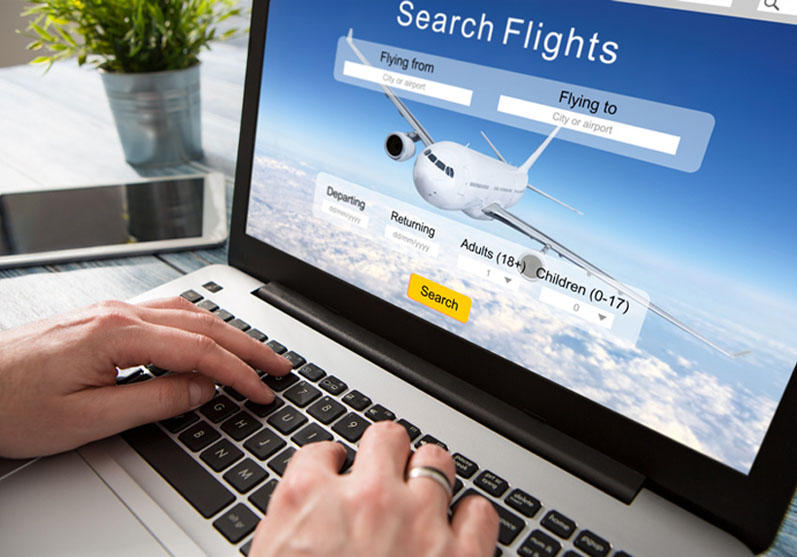
Searching for airfares online
Booking your flights online allows you to take advantage of flight comparison websites to score the best airfare deals.
You need not search each airline individually, as websites like Skyscanner, Momondo, KAYAK, and Google Flights will do all the hard work for you.
It is important to note that some of these websites may not display more obscure budget airlines, so it pays to do a search on a couple of these websites to ensure you are getting the full flight results.
A search of a few flight comparison websites is still better than looking up flights on a dozen different airlines’ websites. There is a theory that you should clear your computer’s browsing history and cookies before searching airfares, as some say airline websites raise their fares if they believe you’re more serious about booking a holiday.
Some people may choose to open an incognito tab while searching for flights. Whether this actually helps is debatable, but it can't hurt to try. Another way to potentially find cheaper flights online is to use an airline website's "flexible search option," which shows rates for several days before and after your selected dates.
This may allow you to choose a cheaper rate if you have the flexibility of changing your travel dates. One last way to possibly score a better airfare is to change the currency you are searching in when it comes to booking international airlines.
Currency conversion is sometimes tricky for airlines to stay on top of, and their conversion may be out of date and work in your favour. Play around with seeing the rates in different currencies and compare the difference to the actual up-to-date conversion rates to see if you are offered a better rate.

Use frequent flyer miles or credit card points
Why pay for flights when you can get them for free?
Whether you're a frequent flyer or not, you should definitely sign up for frequent flyer programs. Over time, you may find yourself with enough miles for a free flight.
Frequent flyer programs are free, and points usually only expire after a long period of account inactivity. Certain credit cards offer frequent flyer miles or points you can exchange for flights as well.
Many have special sign-up bonuses that may gift you with enough points or miles for a free flight right away if you meet the sign-up terms and conditions.
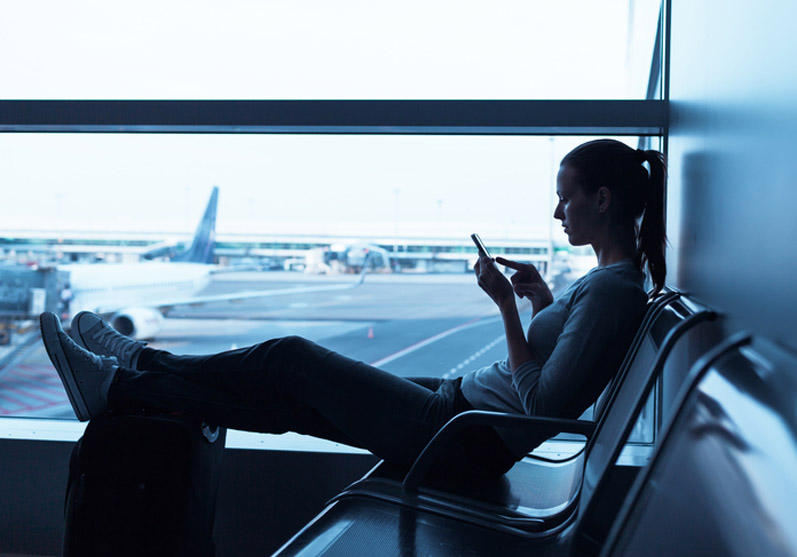
Join airline email lists
Lastly, although you may not like your email inbox being flooded with special offers, subscribing to your favourite airlines' email lists can notify you of special airfare deals.
This saves you from always having to seek out deals, and the emails you receive may even inspire your next travel destination.
Why travel insurance is important?
If you are travelling overseas, or even domestically, taking out travel insurance is highly recommended by the Australian government and smartraveller.gov.au.
1. Getting help overseas
Thousands of Australians experience some kind of trouble when holidaying overseas each year.
Having the right level of travel insurance cover is critical when travelling. If you fall ill or have an accident while overseas, travel insurance can ensure that you get the best quality of care and you can be moved, either back home or to a better medical facility, if needed.
2. Travel insurance provides you with protection from medical costs
- If you require medical attention while travelling, you may be liable for the cost of your treatment if you don’t have travel insurance.
- In many countries, medical treatment for visitors can be incredibly expensive; daily hospitalization costs in Southeast Asia regularly exceed $800; the cost of medical evacuations from the United States regularly range from $75,000 to $95,000 and, in extreme cases, up to $300,000.
- Medicare will not pay or reimburse you for any medical expenses you incur overseas.
3. Travel insurance can cover disruptions to your trip
It’s no secret that when you travel, there is much that’s out of your control. Flights can be delayed or you might need to return home if an emergency occurs.
Without travel insurance, disruptions to your trip can end up costing you a fortune. In many cases, you lose the money you’ve already paid, and have to pay for new bookings too.
Many travel insurance packages will cover you for incidents that are out of your control, so that you don’t have to spend your own money if something goes wrong.
4. You can be reimbursed for your losses and expenses
If your luggage is stolen, lost or damaged overseas, you can end up significantly out of pocket – and if you don’t have travel insurance, you will be responsible for replacing your items.
If you take out the right insurance, however, you can be reimbursed for your losses and expenses, meaning that you won’t lose money due to an airline or hotel blunder, or a thief’s wrongdoings.
How much is your luggage worth?
How to find the best travel insurance
2nd of July, 2019
Holidays are a time for enjoyment and relaxation as we escape the monotony of our everyday lives. Unfortunately, our travel plans don’t always cooperate and unforeseen scenarios can strike at any moment during our travels. This is why more than 90% of Australians choose to take out travel insurance before taking their holidays each year. Unfortunate travel events can happen to anyone, regardless of age or level of health. Travel delays, natural disasters, lost baggage, and sudden illness can all pop up during your travels to spoil the day and hurt you financially if you’re not protected by an appropriate travel insurance policy. Most of us wouldn’t think of foregoing insurance on our beloved home or car, and financially protecting our often costly holidays should be no different. Travel can be one of the largest expenses for many households across Australia, so protecting your holidays is essential. It is important to note that without travel insurance, some cruises will not allow you to step aboard, and there are some countries may not even allow you entry without having travel insurance. While it may be apparent that obtaining travel insurance is a no brainer, finding the best travel insurance to suit your individual needs may not always be that simple. Let us explore what makes a suitable travel insurance policy and what you should look out for when choosing a travel insurance company to go with.
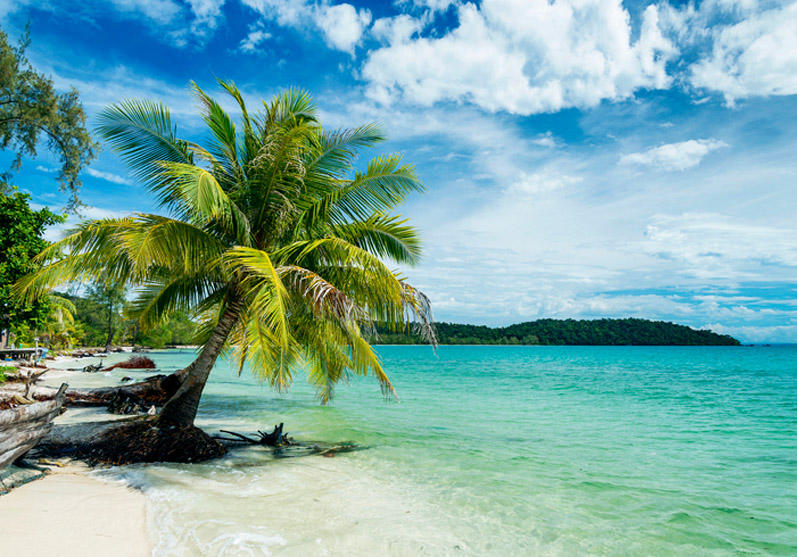
The importance of selecting a reputable travel insurance company
A quality travel insurance policy is only as good as the company backing it. One of the best ways to begin your search for a reputable travel insurance company may be to ask your friends and family who have needed assistance before, so they can give you a firsthand recommendation on what the experience was like. Well-known insurance companies may cover well over a million people annually, meaning certain brands are sure to surface time and again during your conversations with others. Good travel insurance companies will not pressure you into a one-size-fits-all policy; rather they will allow you to select a policy that meets your individual needs. Stick with a company that offers a policy with exactly what you need and won’t force you to accept any extras you can live without.

Search reviews and user ratings
It’s important to search online reviews and user ratings. A simple Google search for “travel insurance” will yield a wealth of results and information that will help guide you to make a wise decision. Don’t simply rely on the reviews supplied by a travel insurance company’s website though. Look at sources like Product Review, Google’s business star ratings, and comparison sites. If you come across a negative review, it’s important to understand why the customer gave a negative review, and decide whether that’s something that will influence your own decision making. Don’t necessarily get hung up on individual negative reviews, as most of the time it is very understandable, and that one experience might not be reflective of most customers. Look at overall ratings and recent reviews to get a clear picture of how well a company operates. You should search reviews not only for positivity when it comes to policies and their value, but also for how well a company processes claims and provides you with emergency assistance during your travels. You want to look for a travel insurance company that offers numerous points of assistance around the world, to help guide you through your travel accidents and misfortunes nearly anywhere you travel.
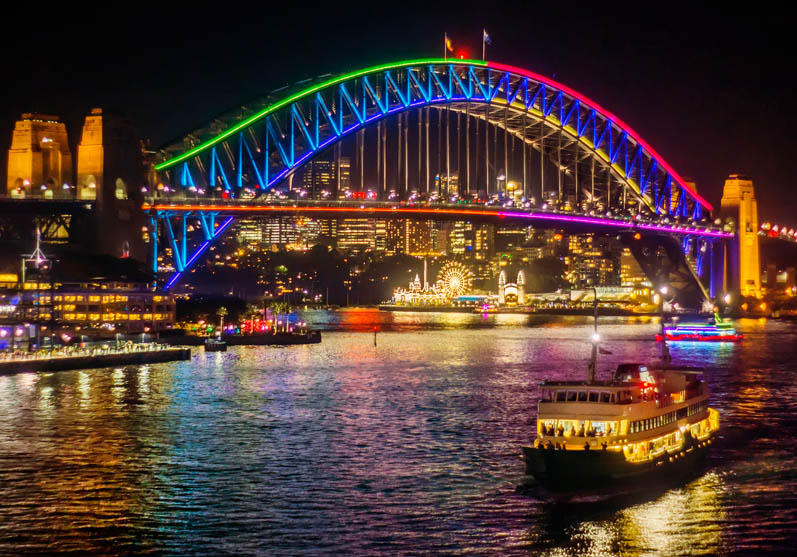
Look for award winning companies
Travel insurance companies can be quite persuasive with their words and promises, but only the top providers will be able to back up their claims with notable awards. Look for awards, recommendations, and trustworthy ratings from impartial consumer advocate groups and comparison companies. For example, Canstar issues awards across various categories of travel insurance. They compare dozens of Australian travel insurers to provide you with a transparent analysis of the best travel insurance options currently available. Canstar’s five star ratings are reflective of the top 10% of travel insurance companies and products.
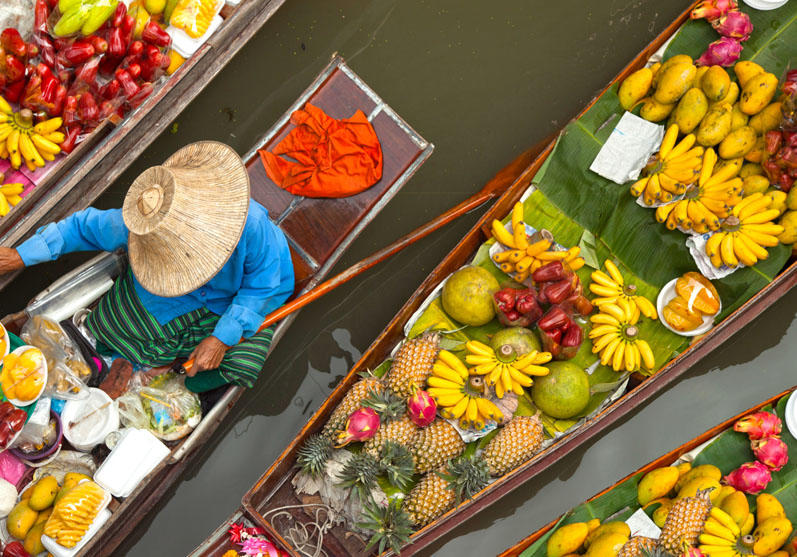
Choosing the right policy for you
No single travel insurance policy is right for all travellers; therefore, it takes a bit of research to find the one that is best suited to your needs. The first determining factor of what policy you end up purchasing depends on whether you will be travelling domestically or internationally. You then have to select whether you need a policy that just covers yourself or one that will cover you and partner or entire family. Whether you are a single student looking to backpack across Europe or are looking to book a cruise, you can be sure that there is a policy specifically designed for your holiday plans.
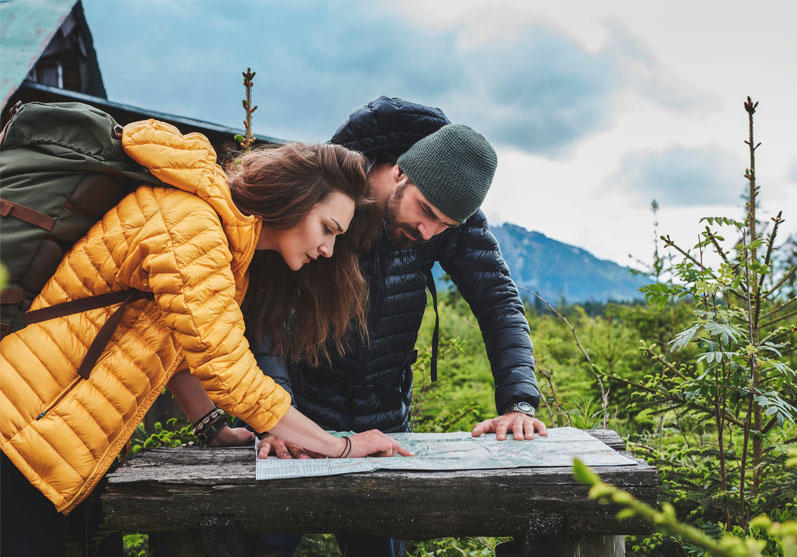
Where are you travelling and for how long?
Once you decide on a policy type, you must also select one that is best suited for where you plan to travel and one that covers you for the entire duration of your trip. Once you decide on where you are travelling and book tickets, you should purchase your travel insurance as soon as possible. You will only pay for the travel dates you have selected, so purchasing early won’t cost you any more money. Purchasing as early as possible will allow you to have early protection in case things like an unknown natural disaster strikes or other covered events prevent you from taking your holiday. Make sure your policy covers all regions or countries you will be travelling to. This is equally as important if taking a cruise holiday as well. Travel insurance policies that provide coverage worldwide will generally cost more than those covering a single region such as Asia or Europe. If you only plan to visit a single country, it may not make sense to purchase a worldwide policy. Again, it is important to note that you may not be able to get coverage for certain countries, most notably those that have travel warnings. You can search Smart Traveller for the latest travel alerts and travel advice for countries all around the world. Whether it’s because of civil unrest or a looming natural disaster, you must make sure that your holiday destination will be covered under your chosen policy. While you may simply want to purchase a single trip policy if you only plan on taking one holiday in a year, it may make sense to look into an annual multi-trip policy if you travel more often. These policies can cover you for several holidays within a year and can be more cost effective than purchasing individual policies each time you travel.
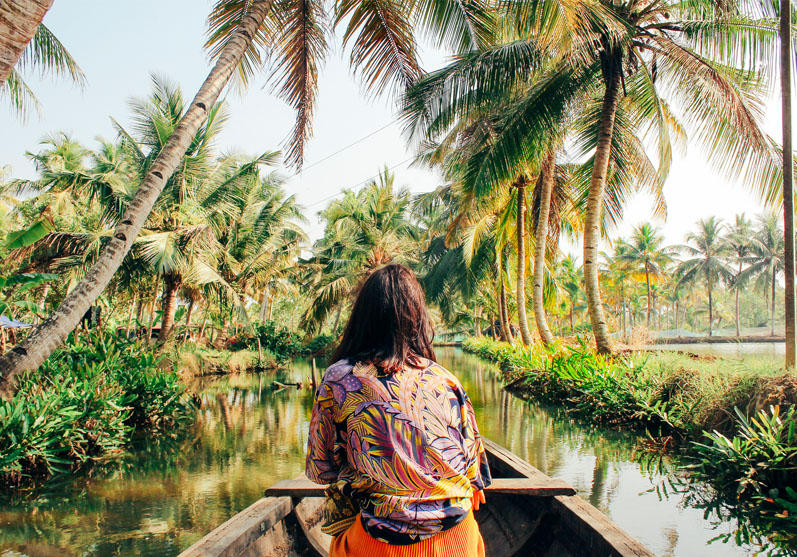
Modes of transportation
Most policies will automatically include coverage for flights, however, you may need to buy specialized insurance if you plan on taking a cruise at some point during your holiday. Even when cruising around Australia, it is important to get cruise travel insurance since you will most likely no longer have Medicare coverage once you leave port. Having cruise insurance for both domestic and international holidays will also cover you for instances of cruise delays, cabin confinement, medical evacuations by helicopter, and missed excursions due to covered circumstances.

Selecting the appropriate level of cover
When it comes to selecting a travel insurance policy, you will generally have several different coverage levels to choose from. The most affordable policies are generally considered basic policies, while gold or top-level policies will provide you with far more comprehensive coverage. Medical expenses can prove to be one of the largest possible expenses you can be hit with while travelling overseas. More comprehensive policies will provide better coverage for things like personal liability, travel delays, lost or delayed luggage, trip interruption, legal expenses, and permanent disability that arise during your travels.
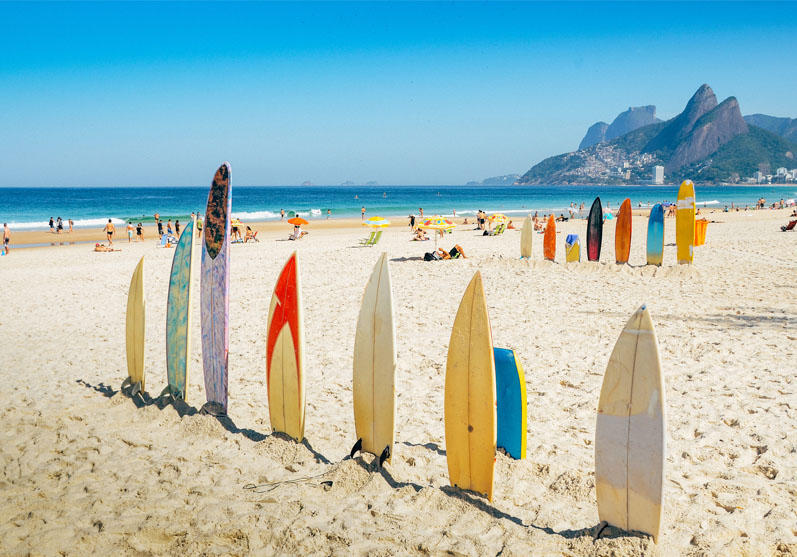
Covering your planned travel activities
Whether you plan on enjoying time on jet skis or flying through the air on zip-lines, you want to make sure all your planned travel activities will be covered. Not all activities may be covered under your policy, so it is up to you to either find out if you can add them for an extra charge or whether to abstain from those riskier activities. Risky activities that may not be covered under most travel insurance policies include skydiving, shark diving, and cliff diving. Should you be planning a winter getaway, you may need to add winter sports coverage onto your policy if you plan on enjoying some downhill skiing, snowmobiling, or ice skating.
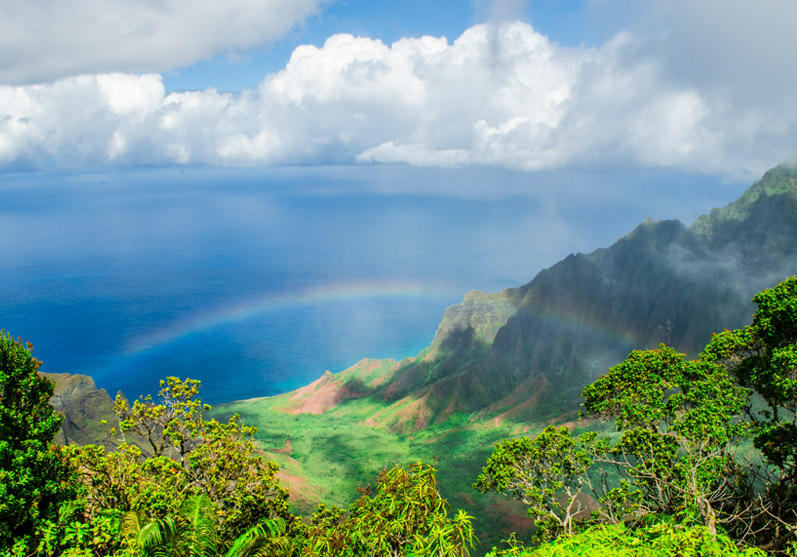
Fully understand your chosen policy
It is vital that you fully understand your travel insurance policy before your travels. Don’t be afraid to ask your insurance company any questions you may have and be sure to read your policy’s product disclosure statement for full policy details. The small percentage of claims that end up being denied are results of travellers not fully understanding the policy they purchased. It is also extremely important to be honest when purchasing a travel insurance policy and you must be sure to disclose any pre-existing medical conditions. Failure to disclose everything may result in your claim being denied. Many pre-existing medical conditions may be included on your policy already or may simply require a bit more cost to provide coverage for. Even if you’re condition is not covered, you may still be able to get coverage for other aspects of your travel and injuries or illness that come about due to causes that are unrelated to your pre-existing condition.

Most common travel insurance claims
According to recent statistics, the top travel insurance claim by Australians most often relates to having received overseas medical treatment due to injury or illness. Medical treatment claims accounted for well over half of all travel insurance claims. The next biggest claim relates to cancelled or delayed trips. This can happen due to a death in the family or when an unforseen natural disaster strikes and stops you from being able to travel to your chosen destination. Rounding up the most common travel insurance claims include things like lost and misplaced luggage, personal liability, legal expenses, and costs for obtaining new passports or other travel documents. Regardless of what type of claim you may have, it is important to keep any official documents or receipts that can be used as evidence to support your claim. Be sure to save all documents and any correspondence you receive from airlines, hotels, police, and overseas hospitals. When a covered event does occur for which you may need to make a claim, it is important to notify your travel insurance company as soon as possible. They can help guide you through the process of submitting a claim and will discuss what evidence or documents you may need.
Say what? Travelling in places where you don’t speak the language
June 27, 2017
Current estimates are that there are over 6,500 different spoken languages in the world. And while English is one of the three most-spoken languages – behind Chinese and Spanish – only 27.5% of countries have English as an official language.
If you want to see some of the world’s most thrilling sites, venturing into parts of the planet where you won’t understand a word is essential. Travelling in a place where you don’t understand the language can be daunting, but there are plenty of ways to prepare to make sure that your trip runs as smoothly as possible.

Take a short language course
If you’re planning a trip to a place with a fairly common language, why not go one step deeper in your planning and learn a bit of the local language before you leave? There are plenty of ways you can do so, to suit all budgets and learning styles.
It’s always worth taking a look at local colleges and learning centres to see if they have any relevant language classes available. If you’re in a city, the range of options can be incredible. But if time or distance rules out taking a class, there are a lot of other possibilities.
One option is to find a language-learning app that offers integrated speaking, listening and reading. The industry standout is Duolingo, an app that offers courses in 23 languages. A former Apple iPhone App of the Year winner, it’s a very convenient way to fit language lessons around your life.
There are also plenty of free online courses from everyone from the BBC to major universities. The BBC’s Languages hub, while no longer updated, offers some amazing resources for learning essential phrases in 40 different languages and has beginner courses for seven of those.
Major international universities also offer free online language courses through platforms like Coursera, EdX and Futurelearn. Check out the offerings well ahead of time as they are often only offered once or twice each year.
There are some languages that are so rare and unusual that it might be difficult to find any resources, but there’s usually a major common language spoken in most areas.

Buy some Apps
There are hundreds of apps available for Apple and Android devices that are designed to help you travel in a foreign country. It’s easy to impulse-buy in the app store, but to avoid wasting money, do your research. Read customer reviews and look at star ratings, including the total number of ratings, as a single five-star rating isn’t as reliable an indicator of quality as 100 4-star ratings.
Look for apps that store the information locally rather than requiring you to access the internet every time you look up a word to reduce roaming data costs and prevent you from getting stuck when you’re out of reception range. Make sure you download all the relevant data when you have access to WIFI.
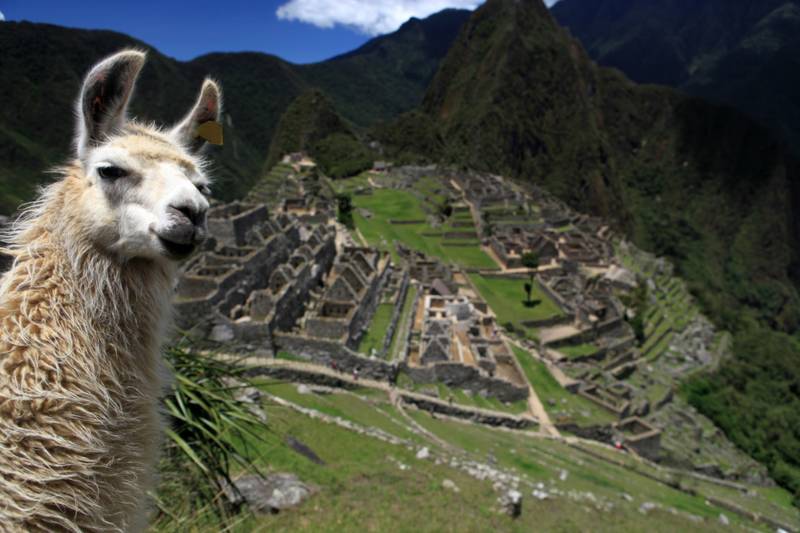
Hire a translator
Sometimes, hiring a bilingual local guide is simply the best way to go. Not only do they know the area, but they also understand the nuances of the local language and can help you get the most out of your interactions with locals.
Depending on where you are, hiring a translator can be quite expensive. Pick the right days of the trip in which you’d like to hire one: earlier the trip might give you the information and tips that will help you get the most out of the rest of the trip.
Again, this is an area where doing your research helps: even though accredited guiding companies may be more expensive to use, they are far less risky, both in terms of quality and safety.
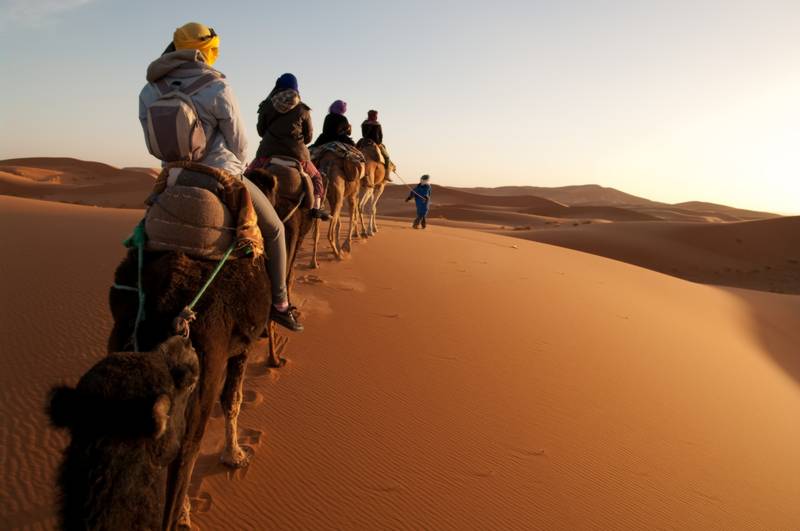
Take a guided tour
Another option is to choose not to go it alone and rather join a tour. With a guide who is experienced in travelling in the country and has the support of a tour company, it’s a far easier way to travel. You do lose out on authentic local experiences and interaction with locals, but the gains in terms of ease and understanding can offset those. It’s definitely an option to consider.
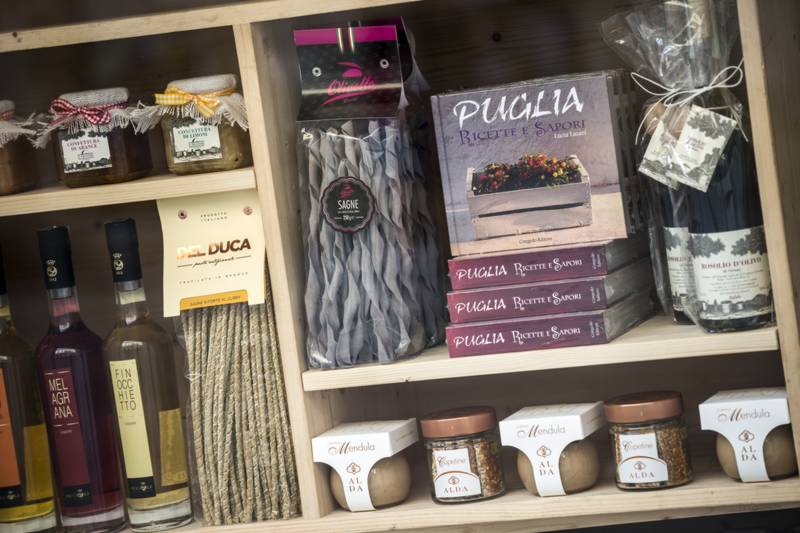
Go for an old-fashioned phrasebook
There’s an inherent danger in relying on technology- especially technology that relies on batteries that can run out two hours into a ten-hour train ride. Have an old-fashioned phrase book- or even just some printed pages with key phrases in the local language—as an essential backup. Having key information, including your accommodation details, written in the local language can also be really helpful when you just can’t get the pronunciation right.
Please also check what is covered as a part of your travel insurance before you start your trip.
Getting away for New Year’s Eve in Australia
Celebrating New Year’s Eve is very exciting – and it’s also a great excuse for a local getaway over the holidays!
If you plan to travel over the break and celebrate New Year’s Eve in another city, town or regional location, here’s what you should know.
Accommodation options
Accommodation options in Australia range far and wide, so your choice is huge. Depending on where you want to go and what you want to see and do on NYE, you can:
- Stay in a major hotel or resort
- Choose from other options like serviced apartments, B&Bs, motels and youth hostels
- Rent a holiday home for your family or a group of friends
- Camp out in the wilderness or in a caravan park
Whatever you do make sure you book your accommodation early. Rooms often book out fast (sometimes a year in advance) and prices can also jump up significantly for NYE.
Keep in mind that many establishments will have a 2-3 minimum night stay over the holidays too.
Watching the fireworks
There are hundreds of places where you can see New Year’s Eve fireworks around Australia, whether you’re in a big city or a more rural spot.
- Major Aussie cities will usually hold key fireworks events around the harbour, water or inner city; make sure you show up early in the day if you plan to picnic and hang out until night time (in popular places, spots fill up fast, so you might not even be allowed in! In Sydney, for example, numbers can reach 1.6 million people around the harbour foreshore alone) (Source: www.sydneynewyearseve.com/fireworks/)
- If you prefer not to be in the central business district, look for fireworks displays and celebrations in other locations near beaches, lakes, rivers or parks
- Rural towns and locales will often hold their own fireworks displays and celebrations usually include things like live music and market stalls
- In Australia, some cities or towns will hold two fireworks shows on the night: One at 9.00pm (great for kids and families who don’t want to stay out late) and the official display at midnight
Eating & drinking out
Eating and drinking out is one of the best bits of New Year’s Eve celebrations.
- If you’re picnicking or camping out, plan ahead and check the regulations on alcohol and what you can/can’t bring with you (e.g. around Sydney Harbour, many firework vantage points are alcohol-free zones) (Source: www.sydneynewyearseve.com/plan-ahead/watching-the-fireworks/)
- If you prefer to have a designated seat for the whole night, you can also book a table in a café, restaurant or bar. This will usually involve paying a package cost for dinner and drinks. If you’re keen to splurge, check out establishments close to the fireworks; otherwise, bargains can often be found elsewhere
- In more remote areas, food and market stalls are common and are a great option for food and drinks on New Year’s Eve
Transport
Researching transport in your local area on New Year’s Eve is also a must. Taxis can be difficult to get and even public transport options can be packed, so plan ahead carefully.
Melbourne, for example, has major transport shut downs and road closures on New Year’s Eve. (Source: www.thatsmelbourne.com.au/nye/plan-ahead)
- What transport options are there to/from your desired spot?
- What time will public transport run to?
- Will there be shut down times after the fireworks?
- What about delays?
If you prefer to be within walking distance of your hostel or accommodation, book early to avoid missing out.
Weather
December and January can be extremely hot in Australia. Make sure you:
- Dress accordingly in light clothing
- Use sunscreen and protect yourself from the sun if you’re going to be out during the day
- Drink plenty of water throughout the day (and night) to stay hydrated
- Stick to shady areas if it is extremely hot
Travel Insurance
- Did you know that over 285,000 Australians travelled domestically in 2014? (Source: www.tra.gov.au/statistics/domestic-travel-by-australians.html)
If you are going to be travelling domestically within Australia, protecting yourself, your family and your possessions with domestic travel insurance is advisable.
Domestic travel insurance can help you cover emergencies and mishaps such as:
- Last minute emergency cancellations
- Flight and travel delays
- Lost, stolen or damaged luggage or possessions
- Lost or stolen cash
- Accommodation, meals and travel expenses cover in the event of an emergency
Remember, anything can go wrong on any type of trip, even when you travel in Australia, so ensuring you’re covered could save you hundreds.
A quick guide to NYE in the capital cities
- Sydney holds a major fireworks event in around the harbour, with much focus on the Harbour Bridge; get organised ASAP if you want to spend NYE in Sydney, as it can get packed out fast
- Melbourne’s celebrations take place around the Yarra River, with fireworks displays shooting off high rises around the city; picnicking is possible or you can secure at seat at any of the Southbank restaurants
- If you’re in Brisbane, Story Bridge is the place to be for fireworks and major celebrations; and on the Gold Coast, you can catch the fireworks display from the beach
- Canberra backpackers should head to Civic Square for two cool fireworks displays (9pm and 12am), as well as a tonne of live music and bands
- In Perth, amazing foreshore fireworks displays are accompanied by a huge street party at Northbridge; there are also a bunch of NYE music festivals you can attend
- The River Torrens is the spot to head to in Adelaide, with two fireworks displays to boot; the night is accompanied by live music, food stalls and even a beer garden
- In Darwin, celebrations often kick off earlier in the afternoon, with plenty of live entertainment, and a 9pm fireworks show for all on the Waterfront
- Hobart is ideal if you’re a foodie or just want to backpack in one of Australia’s most gorgeous wilderness spots; the Taste of Tasmania food festival and the fireworks are the two main events here
For further info on New Year’s Eve events in the major cities, visit Tourism Australia
Travelling domestically for Christmas or New Year’s? Get a fast quote below:
How to Compare Travel Insurance – Levels of Cover, Benefits & More
Comparing your travel insurance choices is often the best way to obtain the most competitive travel insurance cover for your trip. But what sorts of things should you compare and review? And how can you be sure your chosen travel insurance could mean the ultimate care-free journey?
1. Levels of Cover
When comparing travel insurance packages, it is beneficial to understand how much insurance cover you need.
- Make a list of all the areas that you want insurance for and decide how much cover you need for each (e.g. $2,000 or $10,000?). This can make it much easier to see which providers can give you the level of cover you are looking for
- Cover you might want to make a priority in your policy can include: medical, hospital, baggage, valuables, trip cancellations, emergency flights home, delays (travel or baggage), sports/activities equipment or business equipment
2. Pre-Existing Medical Conditions
- When comparing your travel insurance choices, consider the terms each provider has about pre-existing medical conditions; it could be beneficial to look for a provider who is more accepting of your condition than others
- Providers who don’t require medical certificates and documentation upfront (i.e. until you make a claim) can also make the comparing and choosing process much easier
3. Medical Cover
Medical cover is one of the most standard inclusions in all travel insurance policies. However, it is a good idea to compare the different medical entitlements and limits offered by each provider and to make sure that the medical coverage you choose will satisfy your needs.
4. Sports & Activities
If you will be engaging in high risk sports or activities during your trip, it is important to secure cover for these also.
- When comparing your travel insurance choices, consider which policy or upgrade will bring you the most beneficial cover for your intended activities
- You should also keep an eye out for various limits placed on your chosen activities, such as diving to a certain depth or white water rafting to a certain level
5. Excesses
Excesses are sums of money you will be required to pay before your travel insurance provider will begin paying your claims.
- Comparing excesses is usually quite easy and will give you an idea of which provider offers more competitive excess amounts
- You can also look out for providers that offer flexibility in the way of excess waivers (so you won’t have to pay an excess when claiming) or increased excesses (to keep your premiums down)
6. Exclusions
Exclusions will be common to most policies. You should be able to compare your travel insurance exclusions by reviewing your policy and your Product Disclosure Statement.
7. Additional Benefits
It’s often the small things that count! Additional benefits included in your travel insurance can make it all the more appealing. You might want to consider looking out for 24/7 emergency support, free cover for children, easy approval and claims processes.
The Product Disclosure Statement (PDS) can also assist in comparing which level of cover is right for you, so make sure to read this or contact our customer service agents before you buy to understand your options.
If you need help comparing your travel insurance choices or simply deciding what type of cover is right for you, InsureandGo can help. Get in touch with our friendly travel insurance team today!
How Much Does Travel Insurance Cost?
The cost of travel insurance will vary depending on a range of factors about your trip, such as:
- What country/countries you are visiting
- The type of trip you are taking
- The length of your trip
- The activities you will be participating in while away
Other individual factors that can also impact your travel insurance costs include things like age, pre-existing medical conditions and the level of cover or limits you would like.
Options that can affect your total travel insurance costs
Depending on what levels of cover you need for your trip, optional extras can also increase your premium slightly. These options can include insurance cover for:
- Travel delays
- Trip cancellations
- Baggage delays
- Passport, documents and cash
- Extreme or dangerous sports/activities
- Excess waivers on claims
- Journey resumption after cutting your trip short or returning home
- Equipment for golfing or skiing
- Rental vehicle excess waivers
- Additional valuables like iPads, cameras, phones, jewellery
- Personal liabilities and legal expenses
- Pet care if your return trip is delayed and your pet is in boarding
- Loss of income due to injuries while travelling
How can I lower the cost of my travel insurance?
While it’s important to ensure your travel insurance can cover your trip, it is possible to lower the cost of your premiums. You can:
- Increase your excesses on claims (i.e. the amount you have to pay before the insurance company will pay you)
- Consider a multi-trip package if you travel frequently
When choosing your policy, it is essential to make sure that the limits will cover your costs should something go wrong. Remember, just because a policy is cheaper doesn’t mean it is better!
What about cover limits and levels?
Limits are the total amount that the travel insurance company will pay for any one item or area of coverage. The better the level of cover, the higher the limits will usually be. This usually means that your premiums will be slightly higher, but in return, you will be getting a more comprehensive level of cover that can save you thousands if an accident or mishap occurs.
Travel tips for a New Zealand holiday
New Zealand, or the Land of the Long White Cloud, is an amazing place to visit. With snow-peaked mountains, unforgettable coastlines, gorgeous lakes and quirky cities and towns, there’s endless travelling fun to be had here.
At InsureandGo, our priority is to make sure you travel safely on your New Zealand trip, whether you’re enjoying a coffee in Auckland, kayaking in Fiordland or exploring the Bay of Islands. We encourage you to take out travel insurance New Zealand holidaymakers buy to get peace of mind for their travels.
Pre-existing conditions
No matter what your pre-existing condition is, we’ll consider it at InsureandGo.
When you take out travel insurance, with us you must declare all pre-existing medical conditions. We consider pre-existing conditions to be any illness or condition that you have been diagnosed with or treated for in the past five years.
If you’re unsure whether your condition is coverable, all you need to do is ask us. You won’t need to provide any medical documentation or undergo any physical assessments unless you make a claim.
Read more about getting travel insurance for pre-existing conditions or call 1300 401 177 and we can answer any question you may have.
Adventure sports & accidents
New Zealand is an adventure sports playground and many travellers head here to get their adrenalin pumping. Whether you choose to ski, hike, bungee jump or kayak, it’s important to remember that accidents can always happen.
- Make sure your travel insurance policy with InsureandGo covers ALL the sports and activities you plan to undertake in New Zealand; make yourself aware of what situations/circumstances are covered and what might exclude you from cover
- If you injure yourself while in New Zealand, seek medical help immediately
- If your accident is not an emergency, you (or someone you’re with) should contact InsureandGo as soon as possible – we can help you find your nearest medical facility and arrange transport for you if necessary
- If you contact InsureandGo before your treatment, we will also be able to send a ‘guarantee of payment’, if necessary, to the medical facility to cover your treatment costs (assuming you are covered)
Car rentals
If you plan to hire a car while in New Zealand, you should make sure you’re insured. Most InsureandGo policies will cover you for car rentals while in New Zealand, however, your specific policy will explain exactly what driving circumstances you are/aren’t covered for (so read this carefully). Remember:
- You must hold a valid Australian driver’s licence and comply with all rules/regulations while driving your vehicle to be eligible for insurance claims
- If you have selected an InsureandGo Gold International policy, you will be covered for up to $8,000 in rental car excesses (compare travel insurance levels of cover here)
- You need to obey all terms and conditions set out in your contract with the vehicle rental company; failure to do so will mean your travel insurance cover won’t be valid
- You won’t be covered if you drive your vehicle off road, if it has more than nine seats or if you hire it for more than 15 days
Skiing and snow sports
New Zealand is one of the best and most beautiful places to indulge in a range of snow sports. If you plan to hit the snow, you’ll need to purchase InsureandGo’s Winter Sports upgrade.
- Our Winter Sports package covers you for 14 different activities, including skiing, snowboarding, tobogganing, ice skating, cross-country skiing and more (all sports must be undertaken at a commercial resort)
- Your own skiing equipment and your lift pass will also be covered in case of loss, damage or theft
- You’re also covered for additional travel expenses that you need to pay if an avalanche delays your arrival and/or departure
- Keep in mind that if you only purchase InsureandGo Bare Essentials, you will not be covered under the personal accident section of your policy for any winter (or other) sports
Snorkelling & scuba diving
There are many wonderful places to snorkel and dive when in New Zealand. You should check that snorkelling and/or scuba diving is covered by your InsureandGo travel insurance policy. If you choose to dive, you’ll need to ensure that:
- You are a qualified diver or that you only dive with a qualified instructor
- You only dive up to depths of 30 metres (you won’t be covered if you dive deeper than this)
- You never dive by yourself
Theft & belongings
New Zealand is generally a very safe place, but that doesn’t mean that thefts won’t still occur. To keep your belongings safe, make sure they are under your watch at all times and never leave them unattended or with a stranger.
If you do experience any incidents of theft while in New Zealand, report it to police immediately and obtain a copy of the official report for your travel insurance claim.
Is New Zealand next on your travel agenda? Start your quick InsureandGo quote here or call our friendly team on 1300 401 177 to apply.
